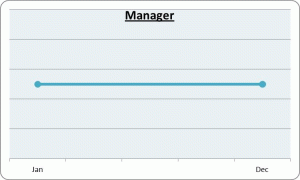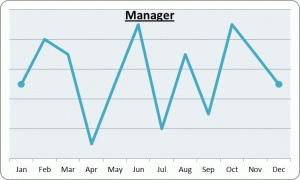The majority of employee survey work is done once a year, or in fact, every two years.
This is an odd cycle given that financial data, sales data, and almost every other piece of business data collection work done within organizations is at a much higher frequency rate.
If an organization’s goal is to help drive performance with employee feedback, then more frequent data are essential. And if an HR team is in the business of delivering high quality coaching to managers, then fast and frequent data are required.
Ready, set, go; it’s annual employee survey time again
As they say, a picture paints a thousand words. First, look at the picture below (Figure 1).

If you were coaching this manager based on this summary statistic, you would assume there was not much change.
You might not even spend time with this manager, eager to be careful to allocate resources to the managers who really needed help. And in most cases the people who get attention are those with dramatic decreases from Year 1 to Year 2.
Now look at Figure 2 (below). As you examine the data points in Figure 2, think about the coaching conversation you would have had based on these pieces of information. Frequent data collection shows a much different pattern and suggests that this manager needs help.

Peer coaching works with frequent data collection
Now you may be thinking about how, given the resources you have in HRM (which are not many for most people), you can help these managers who do need assistance. Even if you had the right data, what could you do to assist?
That problem is easily solved. Rather than trying to coach every manager or hire external coaches to work with managers who need help, there is another fast and easy option.
The HRM team or the external coaches that HR works with can be in the business of training managers to coach each other. Coaching teams can be set up, with managers helping other managers focus on their data and the dialogue that is needed to respond to the data they getting. HR’s job is to find a way to train managers to have their own coaching conversations with each other.
Peer coaching reinforces good habits
This type of peer coaching tends to work well with employee survey data if the questions are focused on work, process, and the business. We have not seen the same kind of success with peer coaching using more evaluative data such as 360 feedback or other type of manager-focused work. That’s because the data that comes in from business-focused employee survey questions are about process, not about the manager. We do not see the same type of defensiveness that occurs when relating information that is more judgemental about a person.
The employee energy data that is the source of the learning in this article asks employees to rate their personal energy at work and then comment on some aspect about the business. In the open-ended comment data, employees rarely talk about their manager in a way that would make a manager defensive. Employees focus on the things getting in the way of productivity.
These types of barriers are process problems, and managers want to learn how to reduce these barriers. Getting rid of productivity blockers makes everyone, and the company overall, more successful. It’s not personal; the work is refreshing and leads to insights and new ideas.
The key to success is having managers engage in dialogue with their employees, and to do this they need to develop some healthy, energizing habits. The HR team can teach the habits, but it takes reinforcement to continue to support the kinds of conversations that lead to innovation and success.
That’s where peer coaching comes in. Managers help each other; the managers of managers also can be trained to facilitate learning.
Editor’s Note: What are the Energy Files? Over 1 million data points on employee energy at work and open-ended comment data on what is making energy increase and decrease. The raw data, the research studies, and case studies make up the Energy Files. To learn more go to www.leadershippulse.com.
Want to participate in the Leadership Pulse surveys that helps to drive articles like this one? The topics are pay for performance and energy at work, and it is done in conjunction with the Marshall School of Business at the University of Southern California. Simply click on the link here to take part. You can also join Leadership Pulse and get personalized reports. Details about membership can be found here.
